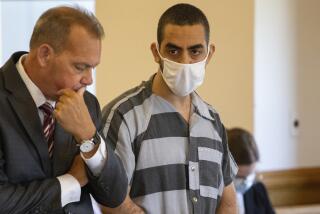Britain Charges Radical Cleric With Having Al Qaeda Materials
LONDON — British authorities Tuesday charged extremist cleric Abu Hamza al Masri with possessing Al Qaeda literature and inciting the killing of Jews and other non-Muslims, delaying his possible extradition to the United States, where he is wanted on terrorism charges.
The Crown Prosecution Service lodged 16 counts against the cleric, whom terrorism experts have long considered a major Al Qaeda supporter in Europe. The move means he would stand trial in England before being sent to the United States.
U.S. authorities accuse Abu Hamza of sending a scout to the United States to explore setting up a terrorist training camp in Oregon, supplying services and recruits to Al Qaeda and to the former Taliban regime in Afghanistan, and of being an accessory to a kidnapping in Yemen in which four foreign tourists were killed.
Abu Hamza, 46, a native of Egypt who moved to England 25 years ago, gained notoriety after the Sept. 11, 2001, attacks as the inflammatory prayer leader who praised the bombings at his north London mosque, which had been attended by several alleged Al Qaeda operatives.
The charges presented Tuesday were based mainly on tapes of sermons he gave in which he allegedly used hateful language and exhorted followers to act violently, particularly against Jews.
He was accused of “threatening, abusive or insulting behavior with intent to stir up racial hatred.” The charges also said that at the time of his arrest in May, Abu Hamza possessed a document “likely to be useful to a person committing or preparing to commit an act of terrorism.”
At his Finsbury Park mosque, Abu Hamza allegedly had contact with Zacarias Moussaoui, accused of being part of the Sept. 11 conspiracy, and Richard C. Reid, who tried to blow up an American Airlines flight from Paris to Miami in December 2001 with explosives hidden in his shoes. But Abu Hamza has denied any involvement in violence.
When the 11-count U.S. indictment against Abu Hamza was made public May 27, British authorities quickly promised an expedited extradition process. But there was some puzzlement in Britain as to why the cleric had been indicted by the United States, and not authorities here, considering that his alleged offenses had been committed while he was a British citizen and on British territory.
The charges issued Tuesday seemed to be an attempt to rectify that situation.
Abu Hamza was accompanied by four police officers when he was brought into the courtroom at Belmarsh Prison, a high-security complex on the southeastern edge of London that has been called this country’s Guantanamo Bay because it is where terrorism suspects are held.
He appeared without the steel hook prosthesis on his right arm that he brandished during sermons on the street outside the Finsbury mosque, and only nodded when asked to confirm his identity by the presiding magistrate, according to news service accounts.
Another custody hearing is scheduled Tuesday at London’s Old Bailey criminal court.
According to Associated Press, the terrorist manual that was alleged to be in Abu Hamza’s possession, the “Encyclopedia of the Afghan Jihad,” was intended for use in the battle against “the enemies of our movement [and] the enemies of Allah.”
A son of an Egyptian army officer, Abu Hamza was born Mustafa Kamel Mustafa. He arrived in England in 1979 to study and obtained British citizenship through a marriage that ended in divorce in the mid-1980s. During his early years in Britain, the burly immigrant worked as a nightclub bouncer.
After his divorce, he returned briefly to Egypt and came under the influence of radical Egyptian cleric Sheik Omar Abdel Rahman, now in prison in the United States on a 1995 conviction for plotting to blow up New York landmarks. Abu Hamza also reportedly went to Afghanistan in 1989 to participate in the war against the Soviet occupation, which ended that year.
Abu Hamza has said that he lost his hands and one eye fighting in Afghanistan, but others say he suffered the injuries while making a bomb in Bosnia-Herzegovina sometime after 1993.
He has been in and out of the news in Britain since taking over as imam at the Finsbury Park mosque in 1996. The U.S. indictment charges that he was an accessory to a December 1998 abduction of 16 foreign tourists in Yemen, including two Americans.
More to Read
Sign up for Essential California
The most important California stories and recommendations in your inbox every morning.
You may occasionally receive promotional content from the Los Angeles Times.










